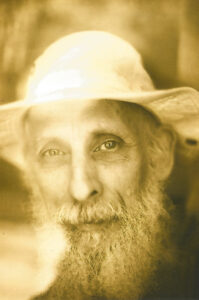We are all of us born in moral stupidity, taking the world as an udder to feed our supreme selves.
– George Eliot, Middlemarch
Look up, Friends. Over your head hovers a crown of everlasting life. – But that’s right, you don’t see it,
do you? We know it’s there, if at all, only by faith. Faith, the Apostle tells us, is the evidence of things not
seen (Heb 11:1 KJV). I was raised an atheist, which made me think very scornfully of religion’s exaltation
of “faith.” Any hypnotist could exploit faith to make you think you were a chicken, or believe that nine
out of ten doctors really recommend such-and-such a brand of cigarettes. It also made me angry at God, if
God existed, for not making Himself or Herself plainly as evident to us humans as the sun in the sky! If
God expected worship from us, it was grossly unfair to reward faith and penalize unfaith when we
creatures were given no God-sensors to tell truth from lies with!
But come back with me and listen again to the Apostle’s words: faith is the evidence of things not seen. If
a thing not seen doesn’t give us convincing reason to believe that it’s there, it doesn’t count as evidence.
We agree that there’s evidence that germs, electrons, and X-rays are there, though they’re all things not
seen. Now – brace yourselves for this – we do have evidence that there’s a God and that God loves the
good and loves us, but we discount it because that knowledge doesn’t come through our five senses:
rather, it’s non-verbal knowledge that we’re born with – it comes with consciousness itself! And faith is
its rightful name. Faith is not mere “belief.” It is a species of knowledge. One sign of its presence is that
we feel shame when we’ve lied or done other evil – a dimming of our relationship with the Creator that
we can feel in our soul, a pang of spiritual sickness detectable on a polygraph.
Now back to that crown of everlasting life over our head, and why we can’t see it or even believe in it as
a metaphor for a real truth: because we’ve been dumbed down. As the theologians say, we’re “fallen.”
They attribute it to the original disobedience of Adam and Eve. In that story (in Genesis 3, and also in the
Qur’an, 2:35-39), Adam and Eve chose to have a will at variance with the Creator’s, and so begat a world
of wills in mutual conflict. The Apostle Paul aptly calls the ruling spirit of this fallen world “the god of
this world” and accuses it of having “blinded the minds of the unbelievers” (2 Cor 4:4 NRSV). George Fox
wrote of this fall, [As for] Adam and Eve’s becoming as gods, they were dead to God… but the serpent he
became their god, and Adam and Eve his slaves, and their disobedient posterity, and were plunged and
baptized into the serpent’s image, likeness, power, and wisdom, by which man knows not God. (“Concerning the Living God of Truth; and the World’s god, in Whom There is No Truth” (1679), in Works, 6:10.)
Slaves! Harriet Tubman claimed that she could have rescued many more of her people from slavery “if
they’d only realized that they were slaves.” And so it is now, with each human enslaved to its own ego, as
A Course in Miracles describes it, the ego being the insane thought that I am this body, separate from
God and all other bodies, and I must be ready to defend myself from external threats by attack. We see it
wherever people come together, each thinking themselves the best judge of what should happen next.
I mention A Course in Miracles, which has been with us for the last half-century, but the idea that the
separate ego of the individual is an illusion, a figment of ignorance, has been taught in India for
millennia. It’s in the Bhagavad Gita, the Yoga Sutras, the Crest-jewel of Discrimination, and the literature
of Buddhism. However, we needn’t go to books outside our own Bible to understand our fallenness and
our slavery to falsehood, particularly since, as Friends have ever held, we have the living Christ available
to open the Scriptures for us. Let us ask His help with this difficult pair of verses from Hebrews:
Since… the children share flesh and blood, [Jesus Christ] Himself shared the same things so that through
death He might destroy the one who has the power of death, that is, the devil, and free those who all their
lives were held in slavery by the fear of death (Heb 2:14-15 NRSV).
Held in slavery by the fear of death! Doesn’t that name our problem exactly? How many wars, crimes,
and campaigns of bullying have arisen from fear of death, and our expectation that we can use others’
fear of death to our own selfish advantage? But Jesus, who would neither let Himself be bullied nor
bully others, laid down His life unresisting, and, we’re told and I believe it, rose from the dead and later
vanished as to the individual body of flesh and blood, living on throughout the creation and particularly
in those who welcome His dwelling in them, and they in Him (see John 6:56 and 2 Cor 13:5).
And now I address you as one member of the living, indwelling Christ to another: God is love (1 Jn
4:8), and Christ is one with God (John 10:30). Perfect love casts out fear, and whoever fears has not
reached perfection in love (1 Jn 4:18 NRSV). Ask your Savior to banish fear from among the things that
motivate you! Make this your top priority! You have heard that the fear of God is the beginning of
wisdom (Prov 9:10), but should the sheep fear the Good Shepherd? The only thing to fear about God is
wandering away from God, which eventually leads to the intolerable, and you can avert that danger
forever by asking God to replace your self-will with God’s will whenever the two wills differ. Then you
will always remain on the safe side of the fence shielding you from the cliffs of destruction, and you
will come to share Paul’s knowledge that “all things work together for good for those who love God”
(Rom 8:28). God has ways of making even the most difficult assignments obeyable.
Beware of all temptations to fight evil with evil: the whole fallen world reasons, “Let us do evil, so that
good may come,” but the evil never fails to beget evil. To use any of the devil’s adversarial weapons
against an adversary only gives another victory to the devil, who keeps humans in slavery through fear
of death – and God did not create death; humans made it by desiring it (Wisdom of Solomon 1:12-16).
Jesus taught and embodied love for one’s enemies (Matt 5:44, Luke 6:27), and in the same spirit, the
Apostle warns the Lord’s servant not to be partisan in controversies, “but kindly to everyone…
correcting opponents with gentleness. God may perhaps grant that they will repent and come to know
the truth” (2 Tim 2:24-25 NRSV). This is how I was won over to Christ. I say it works.

John Jeremiah Edminster (M. Div., Earlham School of Religion, 2019) worships regularly with Conservative Friends and hosts the Tuesday evening House of Light Friends’ Worship Group in his home in Richmond, Indiana. He carries a concern to promote surrender of self to Christ.

What does it mean to be a gathering space for thoughtful and creative reflections on the history, theology, and modern practices of the Church of the Brethren and related movements? Brethren Life & Thought has a long history of working to be such a space. We’re excited to bring our content online through DEVOTION: A Blog by Brethren Life & Thought. Here, you’ll find sermons and other writings from Brethren, Mennonite, and Quaker writers from a variety of theological and social contexts. Some weeks, you might read a piece that resonates with you. Some weeks, you might read a piece that challenges you. Some weeks, you might read a piece you think is heretical. For good or for ill, the Anabaptist and Peace Church movements are remarkably diverse in faith and practice. This blog attempts to expose our readers to the vastness of that diversity – even when it makes us uncomfortable. As you comment, which we highly encourage you to do back on our Facebook page, please remember to do so in light of our membership in the Body of Christ. Let us be different than the world for Jesus truly does invite us to another way of living.

